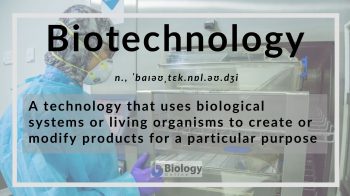
biotechnology
n., ˈbaɪəʊˌtɛk.nɒl.əʊ.dʒi
A technology that uses biological systems or living organisms to create or modify products for a particular purpose
Table of Contents
Biotechnology Definition
Biotechnology is a technology that uses biological systems or living organisms for a particular purpose. It includes a variety of biological techniques and principles applied to product research and development.
Overview
Biotechnology makes use of living organisms (especially microorganisms) or applies biological systems for research and development of products (e.g. antibiotics, insulin, interferon, etc.). These products are produced often with the intent to improve human lives.
Brief History
The first form of biotechnology would apparently be the ancient agricultural practices for food production. For instance, farmers and plant breeders selected specific breeds of plant crops. As a result, the genes of these crops have changed through time and bring about new features that breeders regarded as “beneficial”, e.g. if such agricultural practice or technique led to better crop yield. Selective breeding has also been applied to improve livestock. Other older forms of biotechnology include cheese making, bread making, and wine and beer brewing. (Ref. 1) At present, modern biological techniques have expanded to other fields, e.g. developing products for use in medicine, pharmacology, and many other industries.
Branches
Biotechnology has branched into different fields. Some of them are as follows:
• Gold biotechnology – a biotechnology field that makes use of bioinformatics or computational techniques for data analyses and formulating biological solutions. It also includes nanotechnology. (Ref. 2)
• Blue biotechnology – a biotechnology field that focuses on the use of sea resources for manufacturing products.
• Green biotechnology – this field is concerned primarily with the application of biotechnology in agriculture. Examples: micropropagation, designing transgenic plants, and genetic engineering of plants to express beneficial traits (e.g. pest resistance).
• Yellow biotechnology – the field of biotechnology that involves insects. (Ref. 3)
• White biotechnology – also referred to as industrial biotechnology, is for the application of biological systems or living organisms in industrial processes. Examples include microorganisms genetically-engineered to produce certain chemicals and the use of enzymes as industrial catalysts.
• Red biotechnology – the field that applies biotechnology in medicine and pharmacology. Examples: designing and manufacturing vaccines and antibiotics, producing artificial organs, development of hormones and stem cells.
• Gray biotechnology – the application of biotechnology in the environment and in maintaining biodiversity. It is also used in the removal of pollutants. (Ref. 4)
• Violet biotechnology – concerned with the ethical and legal aspects of biotechnology. (Ref. 5)
References
- Origin and history of beer and brewing : from prehistoric times to the beginning of brewing science and technology ; a critical essay (Book, 2005) [WorldCat.org]. (2014). Worldcat.Org. https://www.worldcat.org/title/origin-and-history-of-beer-and-brewing-from-prehistoric-times-to-the-beginning-of-brewing-science-and-technology-a-critical-essay/oclc/71834130
- Kanwugu, O. N., Ivantsova, M. N., & Chidumaga, K. D. (2018). Gold biotechnology: Development and advancements. https://doi.org/10.1063/1.5055107
- “Yellow biotechnology”: Using plants to silence insect genes in a high-throughput manner. (2012). ScienceDaily. https://www.sciencedaily.com/releases/2012/02/120202151248.htm
- Adepoju, F. O., Ivantsova, M. N., & Kanwugu, O. N. (2019). Gray biotechnology: An overview. PHYSICS, TECHNOLOGIES AND INNOVATION (PTI-2019): Proceedings of the VI International Young Researchers’ Conference. https://doi.org/10.1063/1.5134350
- Kafarski, P. (2012). Rainbow code of biotechnology.
http://yadda.icm.edu.pl/yadda/element/bwmeta1.element.baztech-article-BPP3-0002-0088/c/Kafarski_eng.pdf
©BiologyOnline. Content provided and moderated by BiologyOnline Editors.





